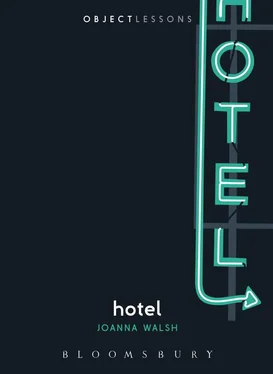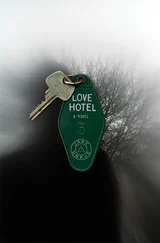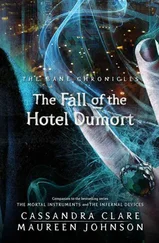PART TWO. FRAGMENTS FROM A HYSTERICAL SUITCASE
Cast:
Freud:
a psychoanalyst
Dora:
a teenage girl
Mae West:
a sex symbol
Groucho Marx:
a member
A Friend:
a friend
I
Dora, a teenage girl, lives at home with her mother and father. Her father is a factory owner; her mother is a homemaker. Her mother has a household disease — a disease in which she makes too much home, too much for the people in it, so much that it makes them want to leave.
Dora’s father “was often absent, visiting his factories,” and, “In high summer he went to a spa in the mountains,” for “his pulmonary complaint.” On these trips he stayed, where? In a hotel, in a clinic? Not feeling at home, Dora (her father reports) “ insists ” that she will join him at the spa.
Dora goes, with her dad, to the spa. They stay where they are not at home. Unheimlich things (involving family, familiarity) happen there nonetheless.
By the lake at the spa resort, a man tries to kiss her; older, her father’s friend, her father’s lover’s husband. She is eighteen.
Aphonia — Dora began to say nothing. Like her aunt, who didn’t eat, and died “after an unhappy married life,” she shut herself up: nil by mouth.
Dora’s father took her to see Dr. Freud.
She had been reading, at the time, her father reported, a book about sex. Perhaps she imagined the whole thing.
Perhaps words manifest off the page.
Silent Dora consented to talk to Freud.
Freud said, as she was kissed, Dora had felt “not only the kiss on her lips but the pushing of the erect member against her body. And the stimulation of that second erogenous zone has been fixated by displacement on to the simultaneous sensation of pressure on the thorax.” She found this so unspeakable that she became silent.
Freud wanted to reveal the truth, the unheimlich , which is, he said in his essay, “The Uncanny,” contained within the heimlich (or is it the other way round?). He thought the truth was something that had to be revealed, and that you could do this with words, and Dora’s case was the first he made into a story by writing it down. Freud chose to believe Dora, not her dad, but Freud thought there was something wrong with Dora’s words. He thought that, though she didn’t complain, she had a complaint that could be cured by new words, by a talking cure.
A disease of language, then?
II
FREUD
She always spoke very dismissively of doctors, whom she had evidently overrated in the past.
I check into home. I have been in a hotel. There is no one at home. It feels like there has been no one there for some time. The lights are off; some of the curtains are closed. Some things have been left around. I can feel the presence of your absence.
I don’t like the way everything is at home here, the unhomely inside the homely. Home contains everything, after all; even its opposite, Hotel. Does home contain workplace, library, office, conference room, all those places outside home, from which I have returned, in which I felt the absence of your presence?
Could home also contain the therapist’s office?
The therapist I go to has an office in a house, which is not a house. The house has been turned into a clinic with treatment rooms for various therapies. From the outside, the clinic does not look like a clinic. It is in a street of houses that all look like child’s drawings of houses. Most of the houses in the street are homes, but the house across the road from the clinic is also not a house, but a small hotel. Enameled in white pebble-dash, it stands out in the grey street like a capped tooth. From the outside both the clinic and the hotel look exactly like houses.
I could go into one, or the other. Which would cure me?
In the clinic’s waiting room there are flowers, just like in a hotel, but they are dried. The walls are white; the curtains are white. There are also chairs arranged, as in a hotel lobby, square against the walls, excusing those who do not want to talk by providing an intimate semblance. But, each time I arrive, I am the only one waiting.
In this waiting room, unlike in a hotel waiting room, which is its lobby, there are no waiters, only me. It is after hours, after work hours. There is no one waiting with me, not even you (“You can come on your own,” that’s what the therapist told me, “if he doesn’t want to come at first, or for every session, or he could just come sometimes, or, otherwise, he could come on his own sometime.”). Here, there is no one from whom I might feel the need to escape. Nevertheless, there are magazines — decor, and travel — which ensure that I can leave the waiting room at any time for a world of other places, places the clinic suspects its clients may prefer. I flip through one. Inside, there’s a hotel on a cliff in Italy, a loft in Williamsburg, a bothy, or whatever, in Scotland (the word tastes right).
FREUD
[Dora] had been given an album of views of a German spa town for Christmas.
In a dream, she escapes into it. It is, Freud thinks, a love token.
In the waiting room, I am waiting. Perhaps, in her room above me, the therapist is waiting too. We are waiting for the appointed hour. We cannot meet before the appointed hour. The waiting room smells of mouthwash as though it were not a therapist’s waiting room, but a dentist’s, as though what is to be mended here is my mouth as well as my mind. Rinse and spit.
The therapist calls:
“Why don’t you come up and see me?”
That sounds funny, like in the movies, like:
MAE WEST
Why don’t you come up and see me, sometime?
Well? Why don’t you come up and see me sometime? Why don’t you ever come? You could come up sometime, or you could just come sometimes. You could otherwise come up without seeing me. You could have been there at home all the time without seeing me. You could have seen me come in, and decided you’d rather not see me. You know that it’s possible.
The therapist wears a shawl that looks like a blanket. Although the weather is hot, she wraps it around herself, a barrier. She says, “You have been through so much.” Perhaps I have, but I cannot get through the shawl. I last three sessions before I quit (I’d told her when we began, I’m not looking for sympathy).
What does Freud call it — angst? That’s German. Does it translate as anxiety, does it translate as anguish? Anxiety is the feeling of waiting for something bad that is going to happen. It is the feeling that the bad thing is already happening during the waiting, a slow-motion feeling that it will happen nevertheless, and that it will not finish happening until it has got all the way to the end. But it never gets to the end, and the anxiety continues. Anguish comes from the Latin angustia , “tensity, tightness” and angor , “choking, clogging,” and from the ancient Greek ἄγχω ( ankho ) “strangle.” Anguish becomes a symptom — perhaps aphonia: its expression, an inability to express anything.
FREUD
You know you are free to leave any time.
The one thing I learn in the clinic: If I express a desire aloud, I immediately think someone will stop me.
Better keep my mouth shut.
III
FREUD
I began my discussion with a little experiment which was, as usual, successful.
Freud asks Dora to look for something on the table that is not usually there. Freud tells us that this is a match holder, a “large” match holder, such as stands on the desk of a hotel lobby. Dora had not noticed it, although “both Herr K and Papa were passionate smokers,” as are Freud and Dora herself. The match holder, most likely, contains matches, but, though Freud mentions the box, he says nothing of what is inside. When he asks Dora to look for something, he is asking her to look for the outside, which is what she would see first, if she were looking for the matches. He asks her to look for one aspect of a thing that relates to the whole. This is metonymy.
Читать дальше












